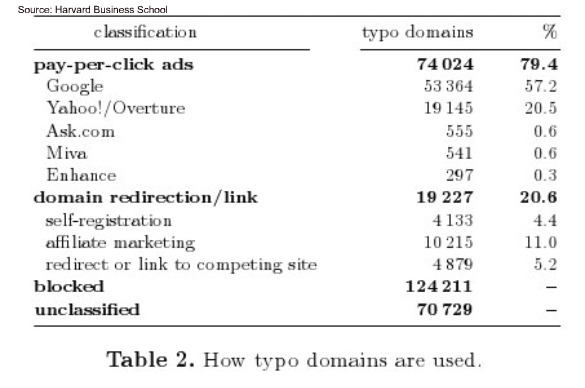Google may be profiting from typosquatters at the expense of online advertisers, according to a study from Harvard University professors Tyler Moore and Ben Edelman.
Google Benefits from User Mistakes
The scheme is a simple one for the perpetrators, according to “Measuring the Perpetrators and Funders of Typosquatting.” Owners of such typosquatting sites place ads on them in the hopes that people who accidentally navigate there will click on them. Moore and Edelman, who has done several in-depth and critical studies of Google’s policies, estimate that Google earns about $500 million a year in such misplaced revenues. According to the study, 57% of typo domains include Google pay-per-click ads.
As Google does not report its revenues from domain parking sites, the study estimates Google’s charges based on a revenue per search metric of 3.5 cents. Extrapolating research across the top 100,000 sites, the study estimates that Google’s revenue from typosquatting on the top 100,000 sites is $497 million per year.
In fact, parking sites including typosquatting sites probably have a higher click-through rate because they typically show only ads, and no other links, according to the study. If so, advertisers’ costs for typosquatting placements could exceed study estimates by a factor of two or more.
An Online Advertiser’s Advocate
Edelman has become an online advertiser’s advocate of sorts with his research. As reported by MarketingVox, he recently identified a new breed of click fraud that not only simulates clicks on a Google ad, but also seemingly generates a ‘real’ customer purchase on the advertiser’s website.
Spyware on a user’s PC monitors the user’s browsing to determine his or her likely purchase intent, he explained in a blog post. Then the spyware fakes a click on a Google PPC ad promoting the exact merchant the user was already visiting.
If the user proceeds to make a purchase, which is reasonably likely for a user already navigating to the merchant’s site, the merchant will naturally credit Google for the sale.
Much of the culpability for this fraud, Edelman says, can be attributed to a search engine that Google uses to broker ads. In the scheme that Edelman tracked, these ads were passed on to more than seven other shady affiliates that perpetuated the fraud through the search engine.

























Leave a Comment